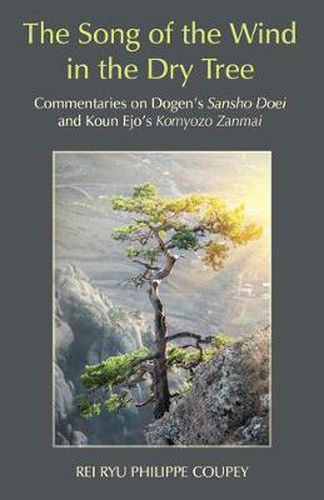Readings Newsletter
Become a Readings Member to make your shopping experience even easier.
Sign in or sign up for free!
You’re not far away from qualifying for FREE standard shipping within Australia
You’ve qualified for FREE standard shipping within Australia
The cart is loading…






This book of commentaries given by Zen Master Philippe Coupey covers two 13th-century Japanese texts. In Part I, he has chosen twelve poems from the Sansho Doei, a collection of poetry composed by Master Dogen Zenji between 1245 and 1253. In Part II, Coupey comments on the complete text of Komyozo Zanmai, written in 1278 by Dogen’s disciple and successor, Master Koun Ejo. The author’s fresh interpretation of these two classic texts rests on an intimate and fundamental experience with this material, beyond space and time. Coupey’s words are addressed to the reader’s heart, shedding light on our own quest and ratifying the discoveries that we may have made along the way. Clearly, then, the message of this book is not intended to come under the heading of scholarship or to add to our intellectual baggage, but to enrich our spiritual life. The twelve poems from Dogen’s Sansho Doei are clear and obvious observations of nature. They comprise a rich facet of Dogen’s poetic sensitivity, set entirely in the immediacy of real life, a direct experience of ordinary consciousness. Dogen’s poems refer to nature; nonetheless, they speak of the experience of awakening at every opportunity. In Part II, Coupey’s commentary on Ejo’s teaching,Komyozo Zanmai, he explains that this timeless teaching is a pure jewel that encapsulates and expresses the purest essence of transmitted Zen. In Coupey’s view, this 13th-century treatise is absolutely no different from all that Zen disciples have received through the ages and are, in turn, transmitting today. This is how zazen, the Way, should be studied , Coupey asserts.
$9.00 standard shipping within Australia
FREE standard shipping within Australia for orders over $100.00
Express & International shipping calculated at checkout
This book of commentaries given by Zen Master Philippe Coupey covers two 13th-century Japanese texts. In Part I, he has chosen twelve poems from the Sansho Doei, a collection of poetry composed by Master Dogen Zenji between 1245 and 1253. In Part II, Coupey comments on the complete text of Komyozo Zanmai, written in 1278 by Dogen’s disciple and successor, Master Koun Ejo. The author’s fresh interpretation of these two classic texts rests on an intimate and fundamental experience with this material, beyond space and time. Coupey’s words are addressed to the reader’s heart, shedding light on our own quest and ratifying the discoveries that we may have made along the way. Clearly, then, the message of this book is not intended to come under the heading of scholarship or to add to our intellectual baggage, but to enrich our spiritual life. The twelve poems from Dogen’s Sansho Doei are clear and obvious observations of nature. They comprise a rich facet of Dogen’s poetic sensitivity, set entirely in the immediacy of real life, a direct experience of ordinary consciousness. Dogen’s poems refer to nature; nonetheless, they speak of the experience of awakening at every opportunity. In Part II, Coupey’s commentary on Ejo’s teaching,Komyozo Zanmai, he explains that this timeless teaching is a pure jewel that encapsulates and expresses the purest essence of transmitted Zen. In Coupey’s view, this 13th-century treatise is absolutely no different from all that Zen disciples have received through the ages and are, in turn, transmitting today. This is how zazen, the Way, should be studied , Coupey asserts.